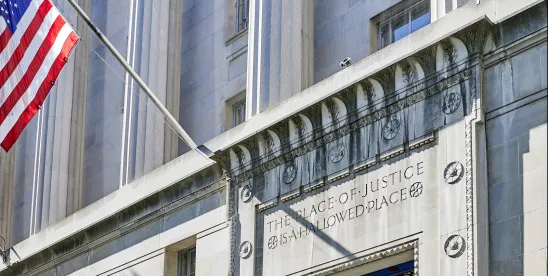On April 15, the U.S. Department of Justice released The Criminal Division’s Pilot Program on Voluntary Self-Disclosures for Individuals (the “Pilot”) designed to encourage individuals to report certain types of criminal activity in return for protection from prosecution. The Pilot follows the DOJ’s previously announced plan to create a new initiative expanding the existing whistleblower bounty program (“the Program”) offer financial rewards to incentivize the reporting of “significant corporate or financial misconduct” otherwise unknown to the government.
The Pilot appears intended to fill a gap left by the Program – namely, that whistleblowers involved in the criminal activity reported would not be eligible to receive a financial award. By creating an incentive for complicit participants to receive a benefit for reporting wrongdoing, the Pilot furthers the DOJ’s long-standing goal of increasing voluntary corporate self-disclosures. Increasing the number of individuals eligible to make reports of corporate wrongdoing in turn increases the risk that the DOJ will learn of alleged wrongdoing. The government hopes this increase will lead companies to conclude that voluntary corporate self-disclosure represents the most logical choice.
The Pilot is premised upon an obvious truth: Individuals involved in wrongdoing arguably have a more compelling need than collecting a bounty – the ability to avoid criminal prosecution for their actions. The Pilot recognizes this fact and creates a system whereby whistleblowers complicit in criminal activity (and thus ineligible to participate in the Program) would nevertheless be eligible to receive a benefit: a non-prosecution agreement (NPA) in return for their cooperation. NPAs shield individuals from conviction and punishment and essentially act as a “get out of jail free card” for those involved in criminal activity.
As the DOJ itself recognized in announcing the Pilot:
The prospect of an NPA may provide a strong incentive for individuals to bring to the Criminal Division’s and law enforcement’s attention actionable, original information about criminal conduct that might otherwise go undetected or be impossible to prove.
The Pilot lists a wide range of criminal activity for which NPAs may be available, including:
- Violations by financial institutions, their insiders, or agents, including schemes involving money laundering, anti-money laundering, registration of money transmitting businesses, and fraud statutes, and fraud against or compliance with financial institution regulators;
- Violations related to integrity of financial markets undertaken (i) by financial institutions, investment advisors, or investment funds, (ii) by or through public companies or private companies with 50 or more employees, or (3) by any insiders or agents of such entities;
- Violations related to foreign corruption and bribery by, through, or related to public or private companies, including violations of the Foreign Corrupt Practices Act, violations of the Foreign Extortion Prevention Act, and violations of the money laundering statutes;
- Violations related to healthcare fraud or illegal healthcare kickbacks committed by or through public companies or private companies with 50 or more employees;
- Violations by or through public or private companies with 50 or more employees related to fraud against, or the deception of, the United States in connection with federally funded contracting, where such fraud does not involve healthcare or illegal healthcare kickbacks; and
- Violations committed by or through public or private companies related to the payment of bribes or kickbacks to domestic public officials.
The Pilot creates numerous prerequisites for eligibility, including that the self-disclosure be truly “voluntary,” that it be “truthful and complete,” and that the reporting individual “must agree to fully cooperate with and be willing and able to provide substantial assistance.” Those who seek to report under the Pilot must also agree to disgorge any profit they made “from the criminal wrongdoing” and “pay restitution or victim compensation.” Additionally, as a prerequisite for eligibility, the reporting individual: (i) must not have engaged in criminal conduct involving violence, use of force, threats, substantial patient harm, any sex offense involve fraud, force, or coercion, or relating to a minor, or any offense involving terrorism; (ii) must not be the CEO (or equivalent) or CFO (or equivalent) of a public or private company; (iii) must not be the leader or organizer of the scheme; (iv) must not be an elected or appointed foreign government official; (v) must not be a domestic government official; and (vi) must not have a previous felony conviction or a conviction of any kind for conduct involving fraud or dishonesty.
Many questions remain about how the Pilot will be applied. For example, it is not clear how the Pilot – which the DOJ’s Criminal Division will oversee – will affect prosecutions by local U.S. Attorney’s Offices, which charge the vast majority of cases. Several offices, including the Southern District of Florida, Northern District of California, and Southern District of New York had earlier this year enacted their own policies that mirror the Pilot.
At this point, it is also unclear whether an NPA represents the floor for those who provide information under the Pilot. Criminal Division prosecutors will still retain discretion to offer an NPA to individuals in “appropriate circumstances,” including those individuals who come forward pursuant to the Pilot, if the criteria listed above are not met in full. But what about those circumstances where the criteria are met? Could a particularly valuable whistleblower avoid all sanctions, even the relatively minimal ones that might be contained in an NPA? Only time will tell.
Perhaps the most interesting aspect of the Pilot is its underlying motivation. While the DOJ certainly wishes to uncover new cases by encouraging direct whistleblower reports, the Pilot seems to be structured to achieve a result far more important to the government. By creating opportunities and incentives for a previously excluded category of would-be whistleblowers, the DOJ effectively seeks to alter the decision-making calculus companies undertake when deciding whether to self-disclose criminal violations. Whereas complicit wrongdoers were previously left to speculate about the possibility that their cooperation might be deemed valuable enough to insulate them from imprisonment or other harsh punishment, the Pilot reduces that uncertainty. In the process, the Pilot breathes new life into the message the DOJ conveyed to companies who discover that its agents have engaged in criminal activity: “knock on our door before we knock on yours.” By coupling the Pilot with the Program, the DOJ takes an additional step in its effort to generate cases from two sources: (i) individuals who report the information to benefit/protect themselves, and (ii) the companies who self-disclose ahead of the reporting individuals in order to avoid being on the wrong side of such a report.





 />i
/>i

